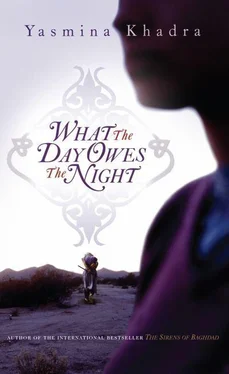THE WINTER of 1960 was so harsh that even our prayers froze; we could almost hear them dropping from heaven and shattering on the hard ground. As if the overcast sky was not enough, dark clouds flocked like falcons over the sun, cutting off what little light might have warmed our numbed souls. Storms were brewing everywhere and no one now was under any illusions: war had found its calling and the cemeteries were answering.
At home, things were becoming complicated. Germaine’s silence saddened me. It upset me that she would walk past me without a word, sit silently with me at dinner staring at her plate, clear the table as soon as I had finished and immediately go upstairs to her room without saying good night. I felt heartsick, and yet I could not find it in me to make peace with her. I didn’t have the strength. Everything exhausted me, everything disgusted me. I would not see reason; I didn’t care I was in the wrong: all I wanted was a dark corner where I refused to let myself wonder what I should do, think about what I had done, decide whether or not I had acted for the best. I was bitter as rose-laurel root, sullen and angry as something I dared not name. At times I heard Krimo’s insults exploding in my head. I would find myself imagining him suffering horribly, then I would shake off these thoughts and clear my mind. I felt no hatred; I had no more rage; my whole being felt so bloated that a breath of air might cause it to explode.
In calmer moments, I thought about my uncle. I did not miss him, but the gaping void he had left reminded me of those who had cut me off. I felt as though I had nowhere to turn for support, that I was floating in a suffocating bubble, a bubble that could be burst by the smallest twig. I had to do something, I felt myself slipping away, slowly disintegrating. So I summoned my dead. My uncle’s memory supplanted mine; his ghost kept at bay all the horrors I had suffered. Perhaps, after all, I did miss him. I felt so alone that I almost faded away myself, like a shadow consumed by darkness. While I waited for my bruises to become less noticeable, I shut myself away in my uncle’s study and pored over his notebooks – a dozen exercise books filled with comments, remarks and quotes from writers and philosophers from all over the world. He also kept a diary, which I found by accident in the bottom drawer of his desk, under a vast swath of newspaper cuttings. He wrote about the dispossessed of Algeria, about the nationalist movement, about the absurdity of the human species that reduces everything in life to a vulgar power struggle, to the deplorable and mindless need of one group to enslave another. My uncle was a supremely cultivated man, both educated and wise. I could still remember his expression when he closed his notebook and looked up at me; an expression that radiated compassionate intelligence.
‘I hope my writings will prove useful to future generations,’ he had said.
‘They will be your gift to posterity,’ I replied, thinking it best to flatter him.
His features tensed. ‘Posterity has never made the grave’s embrace less cruel,’ he said. ‘It simply assuages our fear of death, because there is no better cure for our inevitable mortality than the illusion of a beautiful eternity. But there is one illusion I still hold dear: that is the thought of an enlightened nation. That is the only future I still dream of.’
When I looked out into the distance from my balcony and saw nothing looming on the horizon, I wondered if there was life after war.
A week after Pépé Rucillio’s speech, André Sosa came to see me. He parked his car opposite the vineyards, leaned out of the window and waved for me to come down. I shook my head. He opened the car door and stepped out. He was wearing a large beige coat, unbuttoned to reveal his pot belly, and a pair of leather boots that came up to his knees. From his broad smile, I knew he had come in peace.
‘Fancy coming out for the day in the old banger?’
‘I’m fine where I am.’
‘Okay, then, I’ll come up.’
I heard him say hello to Germaine in the hallway, climb the stairs, then open the door to my room. Before he stepped out on to the balcony to join me, he glanced around at the unmade bed, then crossed the room to the mantelpiece on which sat the wooden horse Jean-Christophe had given me a lifetime ago, after he beat me up at school.
‘Those were the good old days, weren’t they, Jonas?’
‘Days don’t get old, Dédé, we’re the ones who get old.’
‘You’re right. It’s just a pity we don’t improve with the years, like our wine.’
He came outside, propped his elbows on the balcony and surveyed the vineyards.
‘No one in the village thinks you had anything to do with the fellagas. Krimo was completely out of order. I saw him yesterday and told him to his face.’
He turned to me, trying not to look at my bruises.
‘I feel bad that I didn’t come sooner.’
‘What good would it have done?’
‘I don’t know . . . You don’t fancy coming with me to Tlemcen? Oran is impossible now, people are being murdered every day, but I need a change of scenery. Río Salado depresses me.’
‘I can’t.’
‘We won’t stay long. I know a little restaurant . . .’
‘Don’t, Dédé.’
He shook his head slowly.
‘I understand – not that I approve. It’s not good to hole up here, brooding over your bitterness.’
‘I’m not bitter. I just need to be on my own.’
‘Am I bothering you?’
I stared off into the distance so I would not have to answer.
‘It’s insane, this thing that’s happening,’ he sighed, leaning on the balcony again. ‘Who would have thought our country would be brought so low?’
‘It was obvious, Dédé. A whole nation lay down while we walked all over them. Sooner or later they were bound to get up. That’s when we lost our footing.’
‘Do you really believe that?’
This time I turned to him and said:
‘Dédé, how much longer can we go on lying to ourselves?’
He brought his fist up to his mouth and blew on it, measuring his words carefully.
‘It’s true, there was a lot wrong with how things were, but to go from there to waging a vicious, all-out war? It’s not right. There are hundreds of thousands dead, Jonas; that’s too many people, isn’t it?’
‘Are you asking me?’
‘I’m lost . . . I honestly don’t understand what’s happening to Algeria. And the French obviously don’t either. They’re talking about self-determination. What exactly do they mean by that? Does it mean we wipe the slate clean and start again with everyone equal, or . . .’
He did not finish the sentence. His disquiet turned to anger; his knuckles were white.
‘De Gaulle doesn’t understand a fucking thing about our suffering,’ he said, referring to the General’s famous statement to the Algerians on 4 June 1958 – ‘I have understood you’ – which had stirred up the crowds and given their illusions a stay of execution.
A week later, on 9 December 1960, the whole population of Río Salado went to the neighbouring village of Aïn Trémouchent, where the General was holding a meeting that the parish priest called the ‘last prayer mass’. The rumours circulating had prepared people for the worst, but they were not to be persuaded. They were united by fear and so blinkered they would not see the harsh truths bearing down on them. I had heard them, at dawn, taking their cars out of the garages, forming a convoy, joking and laughing to each other, shouting to drown out the insistent voice that would not let them sleep, the voice that said endlessly, relentlessly, that the die was cast. They laughed, they argued, they pretended they still had some say in the matter. But they no longer believed it; their brash self-assurance was belied by their bewildered faces. They hoped that by keeping their spirits up, by keeping up appearances, they might compel destiny to see reason, force its hand, produce a miracle. They had forgotten that the countdown had already begun, that there was nothing left to salvage. Only a blind man would have carried on walking through their dark Utopia, waiting for a day that had already dawned on a new era; an era in which they were to play no part.
Читать дальше












